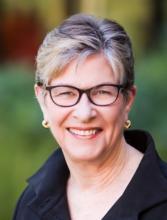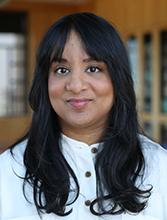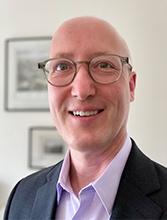
Margaret Tempero, MD
Director, UCSF Pancreas Center; Leader, Pancreas Cancer Program;
Professor of Medicine, Division of Hematology and Oncology, UCSF
Rombauer Family Distinguished Professorship in Pancreas Cancer Clinical and Translational Science
Margaret Tempero, MD, is a Professor of Medicine and Director of the UCSF Pancreas Center and editor-in-chief of JNCCN. Her research career has focused on pancreatic ductal adenocarcinoma, especially in the area of investigational therapeutics. Dr. Tempero has served on the ASCO Board of Directors and as ASCO President. She currently serves on the ASCO Conquer Cancer Foundation Board. She codirected the AACR/ASCO Methods in Clinical Cancer Research and taught this course and similar courses in Europe and Australia. She was founding Chair of the NCI Clinical Oncology Study Section and served as a member and Chair of the NCI Board of Scientific Counselors Subcommittee A. She is a member of the Scientific Steering Committee and Chair of the Clinical and Translational Study Section for the Cancer Prevention & Research Institute of Texas. She is or has been on the Scientific Advisory Boards of the Lustgarten Foundation, the Pancreatic Cancer Action Network, the V Foundation, The Alberta Canada Cancer Board, and the EORTC. She served as a member of the Oncology Drug Advisory Committee for the FDA. She has served as Deputy Director and Interim Director for the UNMC Eppley Cancer Center. She is Chief Emeritus of the Division of Medical Oncology at UCSF. She served as the founding Deputy Director and was later Director of Research Programs at the UCSF Helen Diller Family Comprehensive Cancer Center.

Andrew Ko, MD
Professor of Clinical Medicine; Associate Division Chief of Oncology, Division of Hematology/Oncology
Chief Medical Officer, UCSF Pancreas Cancer Center
Dr. Andrew H. Ko is a specialist in colorectal and gastrointestinal cancers, with a particular focus on pancreatic cancer. He is interested in the development of new treatment strategies, including molecularly targeted therapies, which block cancer cell activity by interfering with specific molecules. Ko earned an undergraduate degree in applied mathematics and biology at Brown University. He earned his medical degree at the Johns Hopkins School of Medicine. After a residency at Beth Israel Deaconess Medical Center, he completed a fellowship in medical oncology at Stanford University. He joined UCSF in 2001. He chairs the NCI's Pancreatic Cancer Task Force; has served on the scientific program committee, grants committee, and specialty editorial board for the American Society of Clinical Oncology (ASCO); sits on the editorial board for multiple peer-reviewed oncology journals, including assuming the role as Associate Editor for GI Cancers for the Journal of Clinical Oncology beginning in 2016; and is a member of the NCCN Pancreatic Cancer guidelines committee.

Rushika M. Perera, PhD
Deborah Cowan Endowed Associate Professor, School of Medicine
Vice Chair, Department of Anatomy
Chief Scientific Officer, UCSF Pancreas Center
Rushika M. Perera PhD is the Deborah Cowan Endowed Associate Professor in the School of Medicine and the Vice Chair of the Dept. of Anatomy. She also holds appointments in the Dept. of Pathology and the Helen Diller Family Comprehensive Cancer Center. Dr. Perera received her PhD from the University of Melbourne in Australia and trained at Yale University and the Massachusetts General Hospital and Harvard Medical School in Boston in Dr. Nabeel Bardeesy’s laboratory before being recruited to UCSF in 2015. Dr. Perera leads an NIH-funded research laboratory focused on understanding how fundamental cell biological processes that regulate metabolism, protein trafficking and quality control are dysregulated in pancreatic cancer cells, with the aim of identifying new cancer specific vulnerabilities that can be targeted clinically. She is the recipient of the NIH Director’s New Innovator Award, the Damon Runyon-Rachleff Innovation Award, the Pancreatic Cancer Action Network-AACR Career Development Award, an AACR-MPM Transformative Cancer Research Award and was selected as the 2021 Gunter Blobel Early Career Award recipient of the American Society for Cell Biology.

Kurt Giles, DPhil
Associate Director, UCSF Pancreas Center
Director of Scientific Affairs, UC Pancreatic Cancer Consortium
Kurt Giles has over 25 years experience overseeing basic and translational biomedical research and has published more than 50 peer-reviewed publications, which have generated over 6,000 citations. He has held faculty positions at the Weizmann Institute of Science, Oxford University, and UCSF. Dr. Giles currently manages operations at the UCSF Pancreas Center, spanning basic research to clinical trials, and leads efforts to translate innovative pancreatic cancer research into improved clinical care across the five University of California Comprehensive Cancer Centers.
Pilot Award for Pancreas Center
- This funding is intended to support projects focused on pursuing the research and eradication of pancreatic neoplasias. Each pilot project will have a maximum budget of $50,000. Pilot projects are for one year and are not renewable.
- View grant and submission details
Mentored Scientist Award in Pancreas Cancer
- A mentoring and training grant targeted toward early stage (either at a senior stage of clinical or postdoctoral training, or junior faculty) investigators at UCSF or affiliated partner institutes who plan to include the study of pancreatic neoplasia as a focus of their career. Each Award will have a maximum budget of $50,000. The funding period is for one year and is not renewable.
- View grant and submission details
Rombauer Early Career Fellowship Award
- A competitive award providing funding for three years to help early career investigators establish themselves in the field of pancreatic cancer research and generate preliminary data for larger federal or private foundation funding.
- Please contact Kurt Giles for more information about award and submission details.
University of California Collaboration
UC Pancreatic Cancer Consortium (UCPCC)
The UC Pancreatic Cancer Consortium (UCPCC) creates a highly collaborative environment to accelerate the progress and impact of work in pancreatic cancer by scientists and clinicians across UC’s five NCI-designated Comprehensive Cancer Centers.
Other Collaborations
The Pancreatic Cancer Early Detection (PRECEDE) Consortium
An international, multi-institutional collaborative group of experts to increase survival for pancreatic cancer patients by improving early detection, screening, risk modeling and prevention for those with a heritable risk for pancreatic cancer, through a novel model of collaboration and data sharing. PRECEDE’s mission is to transform the early detection and prevention of pancreatic cancer, with the aim of increasing the 5-year survival rate from 10% to 50% within the next 10 years. Visit https://precedestudy.org to learn more, or contact [email protected] if you are interested in participating.
Canopy Cancer Collective
Canopy is a learning health network of leading cancer centers. The network of cancer centers is dedicated to improving care and outcomes in pancreatic cancer. Connecting top medical care providers, cancer researchers, and wellness specialists to formulate and foster best practices.
Make a Gift
Pancreatic cancer is the third most common cause of cancer death in the United States. The American Cancer Society estimates that in 2024 over 66,000 people will be newly diagnosed with pancreatic cancer and more than 51,000 people will die from the disease. Pancreatic cancer is a silent killer, as its symptoms are so insidious that most people are not diagnosed until the disease has advanced beyond the stage where surgical resection is possible. Even among surgical candidates, removal of the diseased pancreas and surrounding tissues is rarely curative. To add to this bleak picture, pancreas cancer is also noted for its intrinsic resistance to standard regimens of chemo- and radiotherapy. It is clear that new strategies to prevent, diagnose, and treat pancreas cancer are urgently required.